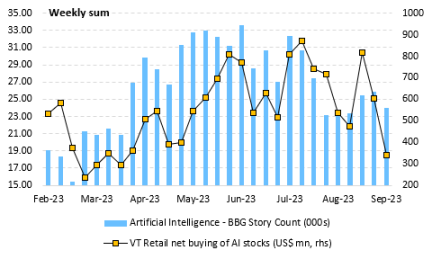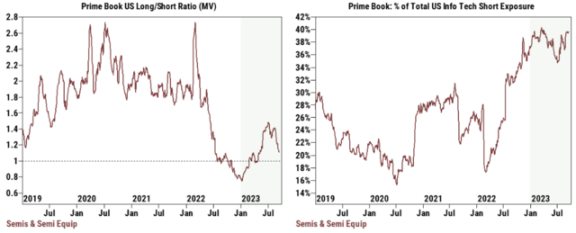US semiconductor and semiconductor equipment stocks have performed significantly worse than the broader market in the past six weeks.
By: Li Dan
Source: Wall Street News
Two weeks ago, a trader at JPMorgan Chase said that the hype around artificial intelligence (AI) is diminishing, and the user experience of these products has been disappointing. A week ago, Vanda Research released a report stating that the attractiveness of AI concept stocks is steadily declining, and retail investors' net buying of AI-related stocks is decreasing.

Goldman Sachs' prime brokerage (PB) recently poured cold water on the AI craze. The report stated that investors are no longer buying US semiconductor and semiconductor equipment stocks, which have performed significantly worse than the broader market in the past six weeks. Since early August, the S&P 500 index has fallen by 2.8%, while the Philadelphia Semiconductor Index has fallen by 9.8%, and recently broke below the 50-day moving average and the 100-day moving average.
Goldman Sachs' PE data shows that in the recent weak stock price environment, hedge funds have been net selling the aforementioned semiconductor industry stocks in nominal value terms, making them the most net sold stocks not only in the technology sector, but also across all sectors.
Specifically, since reaching a year-to-date high in early July, the ratio of the total long and short positions of US semiconductor and semiconductor equipment stocks recorded by Goldman Sachs PE has decreased by 25% to 1.12, which is at a record low of 0.75 at the beginning of the year.
Even more surprising is that in the past month, excluding market value pricing, the net inflow of funds into individual short positions of semiconductor and semiconductor equipment stocks recorded by Goldman Sachs PE has increased by 20%, while the overall fund flow of individual short positions in US stocks has only increased by 4% during the same period.
Semiconductor stocks currently account for nearly 40% of the market value of US information technology (IT) stocks, close to a multi-year high. The problem is, the larger the size, the harder the fall.

On Tuesday of this week, Nvidia, the largest semiconductor stock by market value and a big winner in this year's AI craze, fell by over 2% during the day and closed down by about 1%, resuming its decline after a rebound on Monday, hitting a new low since August 18. It still has a cumulative increase of about 200% since the beginning of the year, but has fallen by over 7% in the past month.
On Tuesday, the major US stock indices, which barely stopped their sharp decline on Friday, returned to a downward trend. Both the S&P and Nasdaq closed at three-week lows, while the Dow closed at over a week low.
Some commentators have said that Nvidia's rebound on Monday was due to some short covering, but it is unknown how much more room there is for short covering to not only save Nvidia, but also the broader market.
免责声明:本文章仅代表作者个人观点,不代表本平台的立场和观点。本文章仅供信息分享,不构成对任何人的任何投资建议。用户与作者之间的任何争议,与本平台无关。如网页中刊载的文章或图片涉及侵权,请提供相关的权利证明和身份证明发送邮件到support@aicoin.com,本平台相关工作人员将会进行核查。




